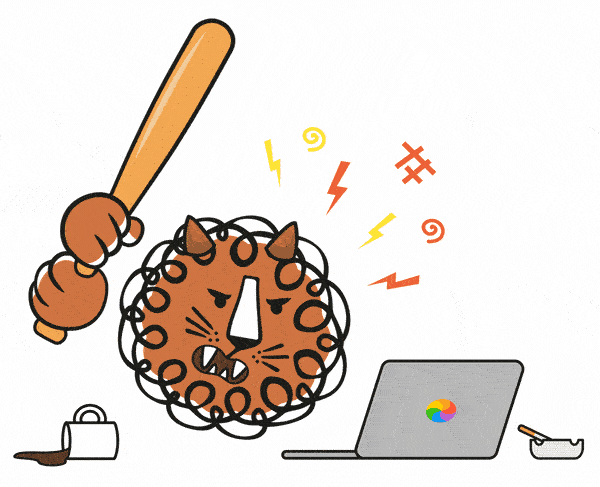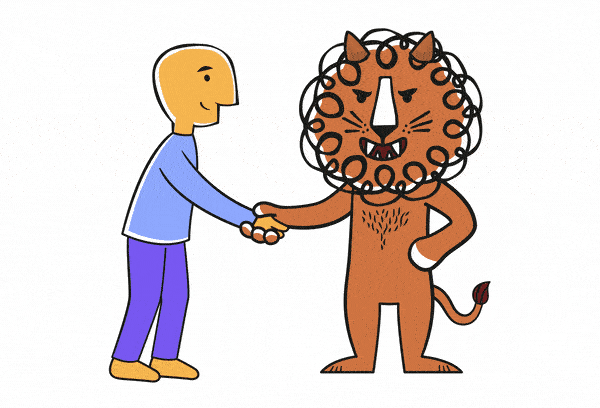Play Devil's Advocate (just don't be a d*ck) - Leon! Animation Studio
If you’ve ever tried to untangle a complicated problem, at some point, you probably hit your head against the wall in frustration, veering into a boiling, diabolic rage. This anger is particularly acute for animators (or anyone who depends on a computer, for that matter).
What if you could use all these negative inclinations to your advantage? How about you try "playing Devil's advocate".
Playing Devil's advocate means taking an opposing position to an argument or point to explore things from a different perspective. You can use it to strengthen an idea by finding flaws and correcting them.
If you think about it, playing the Devil's advocate can be a powerful tool for simplifying complex ideas because you quickly find the flaws. Think about it like looking at the corners of a cube or the joints in a structure.
Or like finding the weak points in a game of Jenga:
Your objective when playing Jenga is to move your piece as safely as possible, right? Well, the Devil's advocate would say something like:
"Actually, your objective in Jenga is to sabotage the structure as much as possible to make someone else more likely to fail."
Both approaches are viable ways to "survive" the game of Jenga. Both are technically true, but you'd have never considered the latter perspective without playing Devil's Advocate.
Taking the position of the Devil's advocate essentially will enable you to understand how things come together at a central point. Sure, that point is typically a weakness rather than a strength, but the approach lets you know how the fundamental pieces of a thing work together.
Let's look quickly at the origins of the phrase:
"Back in ye good ol' days", the Catholic church would determine which individuals were worthy of becoming saints through a process known as "canonisation". During this process, the church would hire a canon lawyer, who would take a sceptical view of a particular candidate's actions. The church, on the other hand, advocated for the prospective saint.
Thus the lawyer played the role of the "Devil's advocate", while the church played the role of "God's advocate". The Devil's advocate played a vital role in verifying the integrity of "miraculous" claims.
This sceptical analysis aimed to explain the supposedly mystical or miraculous. How could this be done? Start at the "corners" or evident flaws and then work backwards or "pull at the seams".
If logical and straightforward questions could explain the miraculous, was it really miraculous?
Taking the sceptical approach, or looking at situations from an opposite or alternate angle, demystified the seemingly miraculous achievements of several candidates for sainthood.
In the context of the Catholic church, they simplified the complicated and thus revealed its true nature.
See where I'm going with this?
Let's look at a more practical modern-day example. Many hackers end up being recruited by high-end security firms. In many cases, even by government bodies and top-secret agencies. Well, why is that?
Well, in a very real way, hackers play Devil's Advocate to cyber security systems. They identify their flaws and deconstruct systems going backwards. Firms often use "red teams" to identify weaknesses and attack them, while "blue teams" defend against them.
At Leon! We play Devil's advocate quite often in our approach to 2D animations. It often helps us identify flaws at early stages in development, i.e. poor 1st drafts, mismatched branding or visuals, or even a far too ambitious deadline. Once we've identified an issue, we can work it out before it becomes something more significant.
NOTE**
There's a big difference between constructive criticism and unrealistic pessimism. If you become too critical of yourself too often, you could build a habit that leads you to hate your work.
Former Manchester United player Ryan Giggs said he never enjoyed playing matches for the club. As soon as he won something, he immediately forgot about it and concentrated on the next challenge. His approach made himself and the "Red Devils" very successful, but was it worth it if he never enjoyed it?
Criticism creates pressure, and pressure is a good thing in moderate amounts. It forces you to look at your work differently, which can inspire incredible ideas. Too much pressure, too often, kills your desire to work. How can you ever have fun if every working moment is due to anxiety-inducing pressure?
If you've been putting too much pressure on yourself lately, try taking a break. Not just a few days off from work, but also a break from work for its own sake. Start a side project just for fun, or start searching for ways to reintroduce fun into the workplace.
Go outside. Learn to enjoy life once more. It's too short not to love your work.
P.S. If you need animations done but more time to play Devil's Advocate on your comms, click on the image below, and we'll handle it for you.
Discover all 10 of our Simplification Commandments: 1) What's the 1st Step?, 2) Knowledge = Powah!, 3) Explain to Toddlers, 4) eXpEriMenT!, 5) Devil's Advocate, 6) Steal Sh*t!, 7) Take a Brake!, 8) Change Goals, 9) Give Up!, and 10) Ask for Help.
Our animation studio services for charities and healthcare organisations use these same principles to transform complexity into crystal-clear explainer videos.











